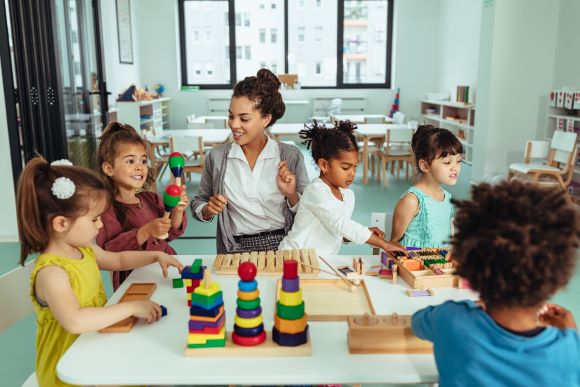
Choosing a Preschool: Montessori vs Gifted?
read •

Dear Dr. Laura,
I'm trying to decide
if a private gifted school or Montessori is the best choice for my very
smart, soon to be 3-year-old boy who is currently in daycare and
has that odd birthday where he will need to start kindergarten late.
Would love your thoughts on Montessori.
The research shows that children do best with play-based, child-led learning, as opposed to academics. This is not only better for their emotional development, it is best for their intellectual development. A child's work is play, and that is how children learn best.
Consider these research findings:
- By the time they were in fourth grade, children who attended “academic” pre-K programs had lower grades than children who attended play-based programs. (Moving up the Grades: Relationship between Preschool Model and Later School Success.)
- Kindergarteners who attended academically-focused schools demonstrated fewer academic kills than children who attended play-based programs. (Randomized control trial of Tools of the Mind: Marked benefits to kindergarten children and their teachers.)
- Children who were randomly chosen to attend an academic state-funded pre-K program in Tennessee ended up with lower test scores in third through sixth grade compared with children who did not attend the academic pre-K. (Effects of a statewide pre-kindergarten program on children's achievement and behavior through sixth grade. )
- Children in play-based preschools grew into teens and adults with significantly improved social responsibility and educational performance, in comparison to children in preschools with conventional teacher-led instruction. (Changing Early Childhood Development through Educational Intervention.)
The gifted schools are often very academically oriented. This is actually not effective in producing a curious child who loves to learn. It ignores the research on how young children learn. And research is very clear that academic programs produce the opposite of the result we want academically.
However, all "gifted" schools are not academically oriented. Some are able to withstand the pressure from parents for children to demonstrate "early" academic skills. Some have extraordinary teachers and a
play-centered philosophy and are terrific. Sometimes what their
literature says is less important than watching what goes on in the
classroom. Are they "teaching" the kids, or helping the kids to explore?
Are they pushing the alphabet, or getting kids excited about stories
and books and acting out plays? Is this curriculum child-led?
I love some things about the
Montessori approach and I confess that I have a personal fondness for
the Montessori manipulatives. There is research that suggests that the Montessori approach has a positive effect on the child's ability to self-regulate, as well as the child's interest in and achievement in academic pursuits.
However, the Montessori philosophy is 100
years old, and is fairly rigid. The most traditional Montessori approach
does not seem to allow much room for creativity and it definitely does
not derive from play, or the child's interests. There is a very
specific series of manipulatives that the children work through. It is important to note, though, that Montessori schools vary widely in
the way they implement the Montessori ideas, and many have updated their approach so that it is more child-led. Almost any
school can call itself a Montessori school, so you will want to check
out the school near you. If at all possible, observe in a classroom to
see what you think.
You also want to be sure that the school promotes social values that
encourage emotional health. All schools say they promote respect, for
instance, but some do it through discipline while others have programs
that are designed to promote empathy. You don't want a school that uses
timeouts as their approach when kids "misbehave," you want a school
that understands misbehavior as a red flag that the child needs some
help from the teacher.
As you can see, choosing a preschool is more about the people than the learning. Regardless of the philosophy, look for an "emotional" home for your child, where the teachers bond with the children in a warm, loving environment.




